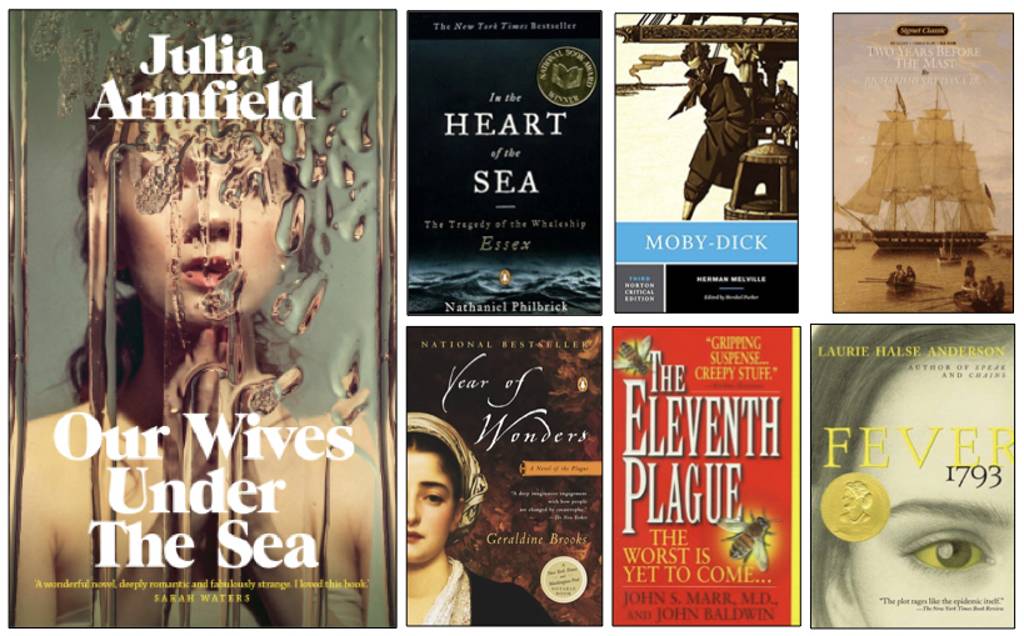It’s time for another adventure in Kate’s 6 Degrees of Separation Meme from her blog, Books Are My Favourite and Best. We are given a book to start with, and from there we free associate six books.
As this month’s starting point, Kate has chosen “a hot favourite to make the 2022 Women’s Prize for Fiction longlist, Our Wives Under the Sea by Julia Armfield.” As wonderful as this book sounds, it won’t be available in the U.S. until July 12, 2022.
first degree
Therefore, I’ve decided to start with a key word from the title. In the Heart of the Sea by Nathaniel Philbrick is the nonfiction narrative of the sinking of the whaleship Essex in 1820. When the ship finally went down after repeated ramming by a huge bull sperm whale, the survivors, in three tiny boats and with almost no supplies, started out on a 3,000-mile journey toward South America. “During ninety days at sea under horrendous conditions, the survivors clung to life as one by one, they succumbed to hunger, thirst, disease, and fear” (Goodreads). Philbrick is a historian with a gift for writing who compellingly brings the events to life.
second degree
Moby-Dick; or, The Whale is Herman Melville’s 1851 novel based on the sinking of the Essex. Now considered a masterpiece, this moving portrait of obsession and the human spirit brought its author neither fame nor fortune during his life time.
third degree
My next entry is another book about seafaring by an American author. In 1834 Richard Henry Dana left Harvard College and signed on aboard a ship headed for California via Cape Horn (around the southern tip of South America). In 1840 Dana published Two Years Before the Mast, based on the personal diary he kept during that voyage. The book’s descriptions of the brutal treatment sailors routinely suffered made it a plea for improvements in their working conditions.
fourth degree
Dana’s book covers two years. Geraldine Brooks has written a book that covers one year, Year of Wonders: A Novel of the Plague. This novel is based on the historical experience of the small village of Eyam in England in 1666, when bubonic plague arrived. Because of a vision by the town minister, the village decides to quarantine itself to prevent spread of the disease. I read this novel 20 years ago and still remember it as a revelation of what life would have been like before modern knowledge of germs, when magic and the will of God were understood as the causes of everything and when scapegoating seemed the best way to deal with a problem.
fifth degree
At about the same time that I read Year of Wonders, I read another novel about a plague, The Eleventh Plague by John S. Marr and John Baldwin. This book is a much wilder ride than Brooks’s: strange and deadly viral infections, retribution of biblical proportions, a virologist suspected by the FBI who must track down the mad serial killer in time to save not only himself but the world. (I have no idea why I was on such a plague-related reading kick back in 2002.)
sixth degree
My final entry is a title that contains both a number and a plague, Fever 1793 by Laurie Halse Anderson. This novel about the 1793 yellow fever epidemic in Philadelphia is aimed at middle-grade readers. It is therefore more realistic and much tamer than The Eleventh Plague but still manages to communicate the desperation and uncertainty that diseases continued to present at the time.
There we have it, from the sea to plagues. Where did your 6 Degrees of Separation take you this month?
© 2022 by Mary Daniels Brown


Very tight links-sea to plague. I’ve only heard of two of these , and only read one, Brooks’. I found it memorable too. I wonder if I’ll ever read Moby Dick? The older I get the less likely I think it will be.
I had to read Moby-Dick during my stint as a PhD student in American lit. But I wonder if I’ll ever get to War & Peace (“the older I get . . .” and all). Thanks for reading.
Love the Massachusetts focus of your chain! I don’t think I ever knew Dana had been a Harvard student – I have not read this book and never knew exactly what it was about.
After his two years before the mast, Dana even went back to Harvard and graduated. I did a stint as a PhD student in American lit. The 19th century bunch tended to cluster in Massachusetts. Thanks for reading and commenting.